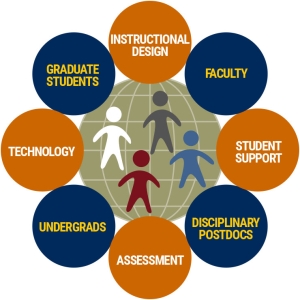
Foundational Course Initiative (FCI)
With an investment of $5 million over 5 years from the President’s Academic Excellence Fund, the University of Michigan’s Foundational Course Initiative (FCI) aims to create a 21st-century model of teaching at scale. Housed at the Center for Research on Learning and Teaching (CRLT), FCI focuses on large enrollment courses that introduce students to a major or discipline. FCI is committed to ensuring the success of students with a wide range of backgrounds and goals in these large enrollment courses. FCI consultants provide the time, resources, and infrastructure to make course transformation feasible and successful.
FCI courses participate in a three-year, collaborative course design (CCD) process. Departments sign MOUs with FCI to establish a partnership between a multi-generational departmental instructional team and educational professionals from CRLT in four areas: assessment and analytics, instructional design and pedagogy, instructional technology, and student support and classroom climate. The goals of course transformation are specific to each course in the initiative, driven by the vision of the departmental team and informed by relevant institutional data and research from evidence-based, inclusive teaching practices. While the specifics of course transformation vary by course, an overarching goal of FCI is to examine strategies to address issues of (in)equity, and to develop strategies and structures that enable students from all backgrounds, and especially students from historically marginalized groups, to succeed.
As of September, 2019, FCI is working with 11 courses across 5 U-M schools and colleges with a total enrollment of over 8,000 students.
For more information, please contact:
Denise Galarza Sepúlveda
Director of the Foundational Course Initiative
Center for Research on Learning and Teaching (CRLT)
Email: [email protected]
Matt Kaplan
Executive Director
Center for Research on Learning and Teaching (CRLT)
Email: [email protected]
